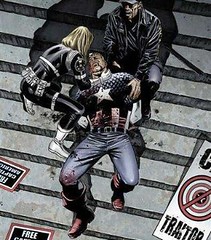America, Dead on Arrival?
Hollywood has recently green-lit a film based on chain-mail wearing, flag-wrapped, World War II super-soldier Steve Rogers, who many folks know as Marvel comics’ literally flagship character Captain America. His fictional former friend, Iron Man, is set to fly on the silver screen played by Robert Downey Jr. and his web slinging associate, Spider-man, will swing into his third blockbuster this summer. There’s only one difference between these three men:

In the most recent issue of his magazine, the comic book symbol of America is fatally shot by a sniper, pronounced D.O.A. on his arrival to the hospital. The event made major news headlines across the nation and even garnered mention on The Colbert Report. While not as widespread, it is reminiscent of the global news phenomenon in 1993, when DC comics “Death of Superman” made worldwide headlines in CNN and Time magazine; even comedians like Jay Leno wore black armbands to memorialize the hero.
The fatal shot came in the wake of a miniseries entitled “Civil War“, which also garnered a lot of press this year. In this storyline, a super-powered battle caused massive civilian casualties, leading the U.S. government to pass the “Superhero Registration Act”. This basically deemed superheroes as living “Weapons of Mass Destruction” and demanded they register their real identities. Some heroes complied and supported the act, including Iron Man and even Spider-man, who unmasked in public and revealed his identity to the world (another dramatic change that made news in 2006 in America and worldwide including the BBC.) However, Captain America the symbol of America’s spirit in comics, disagreed with the Registration Act. As ABC News reported, “Captain America thought the act violated basic civil liberties and led a group of crime fighters who went rogue after refusing to register.”
According to CNN, “Marvel (comics) says the comic story line was intentionally written as an allegory to current real-life issues like the Patriot Act, the War on Terror and the September 11 attacks.” Joe Quesada, editor-in-chief of Marvel Comics, made the talk show circuit to sell the storyline, which is read mostly by adults, not children. The average age of a comic book reader is actually 25, and has steadily climbed in the last several decades. The clash between heroes and our government, and the even more complex storyline of heroes fighting each other due to opposing political ideologies, is truly a spandex reflection of the partisan politics and mudslinging that has made our government a disappointment or laughingstock to many Americans in our culture, particularly in Western Washington where I live.
I have to praise Joe Quesada and Marvel comics for making the story less simplistic than it might have been. Heroes beloved by many readers were placed on both sides with strong, noble but subjective reasons for their position. Even Captain America’s death, shot outside the courthouse as he is brought to trial, came not at the hand of “big government” or “evil corporations”, but those of a third party. However, the polarization of the heroes did seem somewhat forced, as “Iron Man” Tony Stark and his big corporation Stark Industries, sided with the government’s mandate. While this nicely reflected present, negative public perception that our government is in bed with major corporations, it totally rewrote the Stark character, who just a decade before avoided government contracts and didn’t even share his technology with the U.S. for fear of abuse.
Character retooling aside, fans have responded positively to the storyline, and a genre in decline (comic books had significantly shrank as an industry in the last decade) saw yet another consumer troop surge. It’s curious to me how much press attention the death of a fictional character can assemble. Millions of people now know that Captain America is dead, whereas his regular readers measure only in the tens of thousands. Those comic book readers know, by the way, that death isn’t forever. In 1994 Superman resurrected, and I have very little doubt Steve Rogers will be in the coffin for long. Perhaps he’ll pop up to conveniently coincide with the debut of the feature film. And, like a real-life musician or artist made famous by their tragic death, the Captain’s demise was the final bullet needed to shoot a major motion picture. Who will play Captain America in the movie, people are speculating: Kiefer Sutherland? Aaron Eckhart? Paul Walker? Or in light of Cap’s anti-government, left-leaning stance in the comic storyline perhaps Sean Penn?
It seems Captain America’s death not only reflects the country’s growing disillusionment with our government, but with heroic figures in general that have good intentions but aren’t really helping. The red, white and blue character surrendered and went to trial to speak his mind when he looked around a battlefield, seeing that both sides’ well-intentioned conflict was bringing no healing only destruction. Sadly, even an impassioned speech, that might have had an impact where fighting could not, was cut short by a single gunshot. The whole narrative is a sad commentary on our lack of faith in finding a solution for our problems. Captain America becomes a martyr, but not a savior.
A hunger for salvation from this cursed earth is a felt need in every man, even if we argue vociferously on whom or what might provide it. A pervasive hopelessness, that a savior is only fiction, is even more disheartening. Seeing a narrative read by adults but also young readers that reflects this despair in fiction is truly tragic. I praise God daily that my hope and faith is not in myself, or my government, or my church, or a mortal man wrapped in a flag, or any number of fallible saviors. Moreover, by the providence of a good God I don’t have to bury my trust in fictional escapism, or feel even lonelier when my escapist entertainment reflects life and winds up six feet under as well. It’s a good conversation for Christians to be involved with, regarding hero worship and where we place our faith. Many comic aficionados read graphic novels like anti-depressants, 15 minute literary pill-popping that renews a sense of wonder and hope in the world. The problem, as I know quite intimately from my past, is that it doesn’t last.
The cycle of death and resurrection is also curious. Writing a story about Captain America’s death resonates with a populace that feels the American dream is dead. A well-written resurrection, no matter what our surrounding political climate is like, will inspire hope and bring joy at least to the faithful comic readers, a warm placebo even if reality is still not to their liking. I hope some would stop and question why this narrative cycle plays itself out not only in our comics, but in much of our literature. The literal or seeming death of a character, with a subsequent shocking return, is an endlessly used device. One might speculate that it helps us all feel a sense of immortality, but I suspect there is something more at play. There is a desire and underlying knowledge that a real hero did this, once for all, championing death and offering a very real chance for life. A resurrected Superman, and the likely resuscitation of Captain America, is ultimately a pale, fictional reflection of Christ’s atoning sacrifice in the sinful war we perpetually wage against God and our fellow man.
Seeing the red dot from the sniper’s scope on the back of a police officer in front of him, Steve Rogers is not simply assassinated in this fictional tale: his final act of sacrifice is pushing the officer out of the way, making sure only he takes the lethal blow. Sadly, this comic book hero can’t really shield us from the evil that surrounds us, and certainly can’t save us from our own wicked hearts. Thank God there is someone even more heroic who can.
Excelsior, true believer.




Hello! great article. My comment, however, is about a film I think “Cinemagogue” might enjoy. If you haven’t yet seen ‘A Guide to Recognizing Your Saints’ – I definitely would recommend it!!! Keep up the great work!
Cinemagogue is always on the lookout for films that have spiritual themes and interesting narrative points worth discussing. Since Robert Downey Jr. is in the film, it might be nice to see what else he’s been up to besides working on the Iron Man movie! Thanks for the recommendation.